The words, “you’ve got to kick at the darkness ’til it bleeds daylight,” from Bruce Cockburn’s “Lovers in a Dangerous Time,” have traveled well. In some places, they’ve even slipped into the vernacular. The phrase “kick at the darkness” became the title of a Cockburn tribute album, featuring a hit version of the song by pop-rockers Barenaked Ladies. And superstar Bono quoted the expression in his own song “God Part II” on U2’s Rattle and Hum album. Meanwhile, the popularity of “Lovers” helped to make Stealing Fire Cockburn’s best-selling album. But, in crafting the lyric, the Canadian singer-songwriter wanted only to issue a challenge to complacency. “What I meant,” he later explained, “was ...
Music journalism, books and more
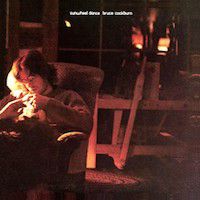 Bruce Cockburn’s third album is an undeniably joyous affair. From the Renaissance-inspired “My Lady and My Lord” to the giddy singalong “For the Birds,” Sunwheel Dance basks in warm, acoustic guitar and bright, hopeful lyrics. Taken together with Cockburn’s previous High Winds White Sky and his self-titled debut, it forms a powerful trilogy that reflects the singer-songwriter’s deep love of nature and his growing spirituality. “It was a period when I was searching but very unaware of my own inner workings,” Cockburn later explained. “There was all this optimism, even though the songs themselves may have been going in different directions. But the imagery of light was there—a lot.”
Bruce Cockburn’s third album is an undeniably joyous affair. From the Renaissance-inspired “My Lady and My Lord” to the giddy singalong “For the Birds,” Sunwheel Dance basks in warm, acoustic guitar and bright, hopeful lyrics. Taken together with Cockburn’s previous High Winds White Sky and his self-titled debut, it forms a powerful trilogy that reflects the singer-songwriter’s deep love of nature and his growing spirituality. “It was a period when I was searching but very unaware of my own inner workings,” Cockburn later explained. “There was all this optimism, even though the songs themselves may have been going in different directions. But the imagery of light was there—a lot.”
Indeed, sunlit images infuse almost every song on the album. On the chorus to the opening “My Lady and My Lord,” Cockburn taunts the wind and rain, knowing that “the sun will shine again.” In the tranquil “Fall,” he sings of walking in a meadow “with sunrise inside,” while the closing “For the Birds” and the hymn-like “He Came from the Mountain” use the sun to describe blue jays and God’s face respectively. Then there is the mandolin-driven “When the Sun Falls” and the album’s breezy title track, the first instrumental to showcase Cockburn’s formidable
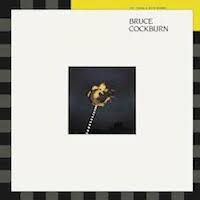 People have made a great deal of fuss about Bruce Cockburn’s activism, usually citing his song “If I Had a Rocket Launcher” as evidence of a sudden shift toward radical politics. He wrote the controversial in 1983 after making his first trip to Central America, where he visited a refugee camp that was attacked by U.S.-backed military helicopters. But, as Cockburn fans know, it wasn’t the first time the respected Canadian singer-songwriter had vented anger at imperialist intervention. He’d tackled the topic as far back as the mid-1970s, with his “Yankee gunboat” song “Burn.” In fact, Cockburn’s political views had evolved steadily, as a direct extension of his spirituality. “Can’t be an innocent bystander,” he declared on his 1981 album, Inner City Front, “in a world of pain and fire and steel.”
People have made a great deal of fuss about Bruce Cockburn’s activism, usually citing his song “If I Had a Rocket Launcher” as evidence of a sudden shift toward radical politics. He wrote the controversial in 1983 after making his first trip to Central America, where he visited a refugee camp that was attacked by U.S.-backed military helicopters. But, as Cockburn fans know, it wasn’t the first time the respected Canadian singer-songwriter had vented anger at imperialist intervention. He’d tackled the topic as far back as the mid-1970s, with his “Yankee gunboat” song “Burn.” In fact, Cockburn’s political views had evolved steadily, as a direct extension of his spirituality. “Can’t be an innocent bystander,” he declared on his 1981 album, Inner City Front, “in a world of pain and fire and steel.”
Completed immediately prior to that fateful Central American trip, The Trouble with Normal bristles with much of the same anger and outrage. Cockburn had been given a book of poetry written by Sandinista priest Ernesto Cardenal and read it while on holiday in the Canary Islands. Those revolutionary poems inspired Cockburn to write
Canadians have a peculiar ability to downplay—or forget altogether—their artists’ achievements. “Cultural amnesia,” Margaret Atwood once called it. Canada’s first lady of letters could well have been referring to how the fabulous Paupers were (until now) relegated to the delete bins of Canadian music history. Atwood was giving her first poetry readings at Toronto’s Bohemian Embassy when The Paupers were establishing themselves as a legendary live act up the street, in Yorkville clubs like the El Patio and Boris’ Red Gas Room. The group went on to score radio hits such as “Simple Deed” and “If I Call You By Some Name.” But most significant—and forgotten—is the fact that in the months leading ...
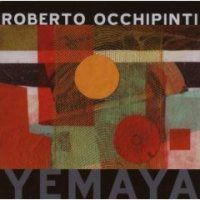 Rare is the bassist who steps forward to lead his own ensemble. Rarer still is the bandleader who successfully bridges the worlds of jazz and classical music. Roberto Occhipinti clearly belongs to that rare breed. On his first album, 2001's Trinacria, Occhipinti explored the range of Latin jazz through works by Thelonious Monk, Cuban piano virtuoso Hilario Durán and his own compositions. His follow up album, 2003's The Cusp, expanded on the concept, adding violin, flutes, reeds and horns while tackling composers as diverse as Wayne Shorter, Jimi Hendrix and Giacomo Puccini. Now, with Yemaya, Occhipinti has given full flight to his musical vision, employing horns, a string quartet and a full string symphony orchestra on classical arrangements of Cuban, Brazilian and original jazz pieces. It’s an inspired synthesis.
Rare is the bassist who steps forward to lead his own ensemble. Rarer still is the bandleader who successfully bridges the worlds of jazz and classical music. Roberto Occhipinti clearly belongs to that rare breed. On his first album, 2001's Trinacria, Occhipinti explored the range of Latin jazz through works by Thelonious Monk, Cuban piano virtuoso Hilario Durán and his own compositions. His follow up album, 2003's The Cusp, expanded on the concept, adding violin, flutes, reeds and horns while tackling composers as diverse as Wayne Shorter, Jimi Hendrix and Giacomo Puccini. Now, with Yemaya, Occhipinti has given full flight to his musical vision, employing horns, a string quartet and a full string symphony orchestra on classical arrangements of Cuban, Brazilian and original jazz pieces. It’s an inspired synthesis.
The album opens with "Maracatres" by Brazilian pianist Jovino Santos-Neto, in which saxophonist Phil Dwyer's fluttering solo floats over a swelling ocean of horns and strings. The breezy title track has bata drummer Pedro Martinez singing a warm homage to the goddess of sea and nature in the Afro-Cuban religion while Moscow's Globalis Symphony lend rich orchestral accompaniment. Equally striking is the sumptuous string arrangement of
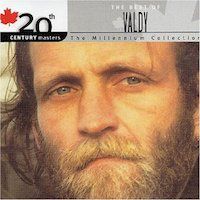 There’s still something reassuring about Valdy’s voice. Like a big Cowichan sweater, the kind the singer used to favour back in the 1970s, its sound envelops with a warm, fuzzy idealism that tells you all is right with the world—even if it isn’t.
There’s still something reassuring about Valdy’s voice. Like a big Cowichan sweater, the kind the singer used to favour back in the 1970s, its sound envelops with a warm, fuzzy idealism that tells you all is right with the world—even if it isn’t.
That, of course, was Valdy’s secret. He was a master illusionist, a city boy who made us believe him a country man and, best trick of all, a complex guy who preached the simple life. Make no mistake: his heart was in the right place, but Valdy was “more of a manipulator than a singer or a songwriter,” as his manager candidly put it. He wanted to make us feel good and, for much of the ’70s, he did.
Once touted as the heir to Gordon Lightfoot, Valdy was that rare breed of artist who, like Stan Rogers or Stompin’ Tom Connors, got under our skins with songs that seemed to spring straight out of Canadian soil. At a time when people dreamed of getting back to the land, Valdy personified that ideal for individuals trapped in school or dead-end jobs. His five top-selling studio albums for A&M, all represented in this collection, reflect the rustic side of Canadian pop in the ’70s, acoustic alternatives to April Wine or Bachman-Turner Overdrive that stil
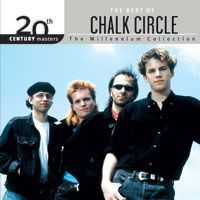 A thinking band from the 1980s, Chalk Circle was that rare group of musicians who combined socially conscious lyrics and chiming guitars in an age dominated by big hair and synthesizers. Listening to the band’s music again, what stands out is how fresh and forceful it still sounds. The songs have aged remarkably well.
A thinking band from the 1980s, Chalk Circle was that rare group of musicians who combined socially conscious lyrics and chiming guitars in an age dominated by big hair and synthesizers. Listening to the band’s music again, what stands out is how fresh and forceful it still sounds. The songs have aged remarkably well.
Part of the reason lies in Chalk Circle’s sources of inspiration: literature and the environment. The group took its name from a play by Bertolt Brecht, about fighting for your convictions in the face of pressure. And the band members, who grew up in Newcastle, Ontario, near the controversial Darlington Station, never shied away from writing about the dangers of nuclear power. As singer-guitarist Chris Tait, who wrote most of the groups lyrics, put it: “We feel most comfortable writing about subjects that are around us.”
Originally formed as a trio in 1983 by Tait, bassist Brad Hopkins and drummer Derrick Murphy, Chalk Circle rounded out its sound with the addition of keyboardist Tad Winklarz, a classically trained pianist who fled his native Poland shortly before the imposition of martial law. The song “Buildings” arose from one of the first
Max Webster, in its heyday during the mid-to-late 1970s, was a sight to behold. The wildly attired foursome led by singer-guitarist Kim Mitchell, a hyperactive beanpole who regularly drew comparisons to crazed animals and aliens, looked more like a futuristic circus act than a rock band. Merry minstrels with a mutant twist. The sound of the band was equally impressive. An anarchic blend of heavy metal and progressive rock, featuring both piercing guitar solos and dreamy keyboard sequences, it was party music for thinking people. Rather than clichés for drunks, the band’s lyrics—written by the group’s offstage conceptualist, Pye Dubois—dealt with themes of tortured anxiety and sensual escape....
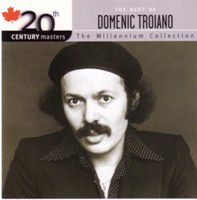 Guitar gods are usually pretty one-dimensional: masters of fretwork, they can be counted on for outrageous riffs and awesome solos, but rarely deliver quality songwriting or strong leadership. Domenic Troiano is a major exception. The consummate musician’s musician, he has written superb songs and fronted numerous bands—all the while contributing dazzling, distinctive guitar work.
Guitar gods are usually pretty one-dimensional: masters of fretwork, they can be counted on for outrageous riffs and awesome solos, but rarely deliver quality songwriting or strong leadership. Domenic Troiano is a major exception. The consummate musician’s musician, he has written superb songs and fronted numerous bands—all the while contributing dazzling, distinctive guitar work.
Over the course of his 40-year career, Troiano has also been highly prolific. In one seven-year period in the 1970s, he released five solo recordings and four band albums as a full-fledged member of the James Gang and the Guess Who. During this time, he also lent his unique guitar work to albums by Joe Cocker, David Clayton-Thomas, Diana Ross, Ronnie Hawkins and Donald Fagen, among others.
Such is the depth of Troiano’s musical genius that he has been able to fill the shoes of several legendary guitarists over the years, replacing Robbie Robertson in Ronnie Hawkins’ backing band and Joe Walsh in the James Gang, before helping to fill the void in the Guess Who left by Randy Bachman’s departure. In 1996, Troiano’s significant contributions were recognized when he was inducted in the Canadian Music Hall of Fame.
Born in Modugno, Italy, Troiano immigrated with his family to Canada as a boy and by high school had established himself in Toronto’s burgeoning
Rounding out the 1970s and completing a trilogy of acoustic jazz-folk albums that included In the Falling Dark and Further Adventures Of, Bruce Cockburn’s Dancing in the Dragon’s Jaws stands as both an era-ending album and a cumulative release that neatly built on the strengths of its predecessors. It also serves as a high-water mark for Cockburn in several respects. Featuring some of his finest guitar work ever, the album was voted an “essential” recording by Acoustic Guitar magazine, putting Cockburn in the prestigious company of such revered pickers as Django Reinhardt, Andrés Segovia, Bill Frisell and Mississippi John Hurt. It also provided Cockburn with a commercial breakthrough on the ...

